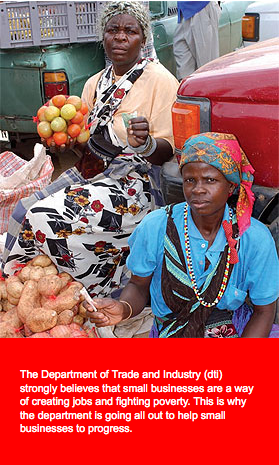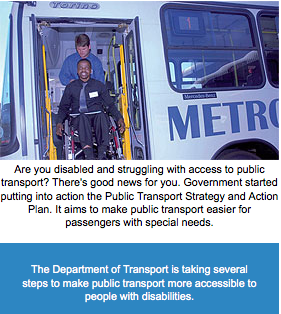Helping small businesses to help themselves
Helping small businesses to help themselves sadminThe Department of Trade and Industry (dti), is helping thousands of small businesses in townships and rural areas. Their programme "Taking dti to the People", aims to inform people about products and support services for small businesses, offered by the department and its agencies. This is done through road-shows across all the provinces.
Information sessions
The Department started "Taking dti to the People" in July 2006. Its main purpose is to empower small, medium and micro enterprises in townships and rural areas.
This is done by giving people information that will help them to start new businesses or grow their existing businesses.
The road-shows take the form of information sessions, in which small business-people and those wanting to start small businesses, get advice. It includes how to start and register businesses and how to apply for funds to grow small businesses.
Agencies
The programme also tells people about the department's group products and services, as well as support services by the department's agencies.
These agencies include the Companies and Intellectual Property Registration Office (CIPRO), Khula, South African Micro-finance Apex Fund (SAMAF), the South African Women Entrepreneurs Network (SAWEN) and the Small Enterprise Development Agency (SEDA). SEDA has already established 40 branches around the country.
Women
Through SAWEN, the department started the Isivande Women's Fund (IWF) earlier this year. The fund started by setting aside R500 million to give business-women loans ranging from R30 000 to R5 million. The fund is divided into two focus areas, namely Isivande I and Isivande II.
Isivande I was started with R100 million. Old Mutual invested R50 million as a partner. This portion of the fund helps rural and semi-urban businesses. It targets companies that make a profit of not more than R100 000 per year.
Commitment
"Taking dti to the People" shows government's commitment to work together with communities across the country, as well as with provincial and local governments.
By doing so, the programme reaches remote and deep rural communities where people don't have ready access to information. Getting useful information empowers small-business owners to grow their businesses. It also gives hope to those who want to start their own businesses, but do not know how to start.
Call the Department of Trade and Industry: 0861 843 384, or call 1020
- Mbulelo Baloyi
Easier transport for disabled
Easier transport for disabled sadminMany disabled people dreaded travelling on public transport in the past because of the lack of facilities for wheelchairs. But things are now improving for them. Through the Public Transport Strategy and Action Plan of 2007, the Department of Transport is taking several steps to make public transport easier for people with disabilities. This is done in partnership with provinces and municipalities.
The Department has already started a number of trial projects. These include the Sukuma Project in eThekwini Municipality and the Dial-A-Ride in Cape Town.
Taxis
The South African National Taxi Council (SANTACO) and council members in the nine provinces are working with municipalities and transport authorities to make taxis accessible to disabled people.
Several taxi associations in different provinces have already introduced vehicles specially adapted for people with disabilities. New taxis will be built in such a way that people in wheelchairs can easily get in and out.
All new taxis that have been specially adapted to accommodate wheelchairs, must have clear signs that say they are certified to carry wheelchair users.
Routes
The City of Johannesburg already has a public transport plan in place that is user-friendly to people with disabilities.
For example, the city has several routes where buses stop at disabled people's organisations. These include the Soweto Workshop for the Blind, the National Council for Persons with Physical Disabilities, and special schools.
Buses
Public buses will be fitted with special ramps. The City of Johannesburg's Metrobus service already has in its fleet 15 low-floor, wheel-Easier TRANSPORT for DISABLEDchair-accessible buses. This means the floor at the entrance of the bus can be lowered to street level to allow wheelchairs easy access.
In the case of high-floor buses, the Action Plan proposes that the buses be fitted with mechanical hoists. Buses will also have things like hand rails and special areas inside for wheelchairs.
Learners
In KwaZulu-Natal, the provincial education department bought 58 new buses worth R55 million to transport deaf and mentally disabled children.
The department bought the buses because it was difficult for learners with special needs to take public transport to school. Seventeen of the 58 buses were handed to schools around Durban in November last year.
For more information, call the Department of Transport Call Centre: 012 309-3657, or the National Council for Persons with Physical Disabilities in South Africa: 011 726-8040, or call 1020
- Mbulelo Baloyi